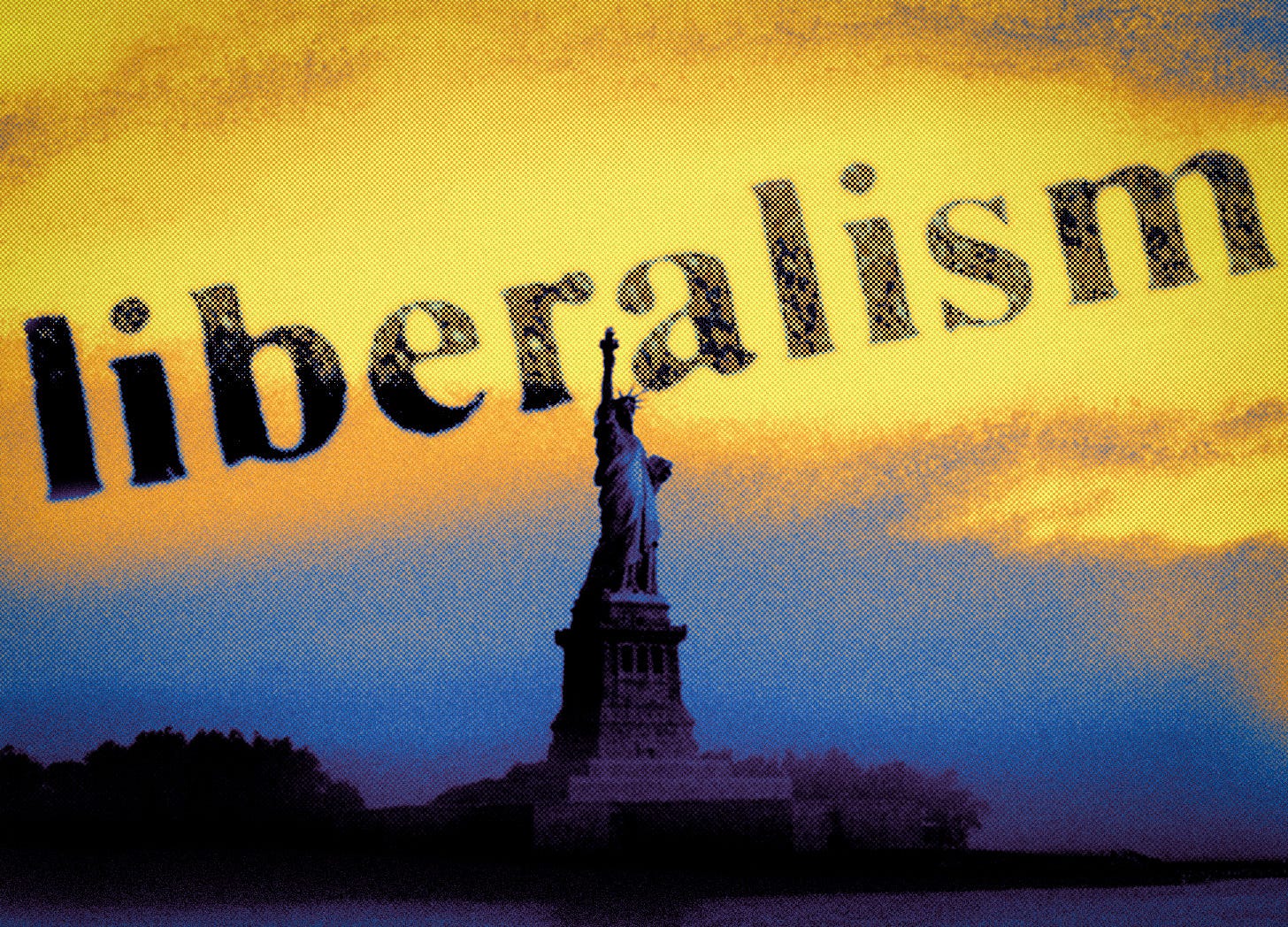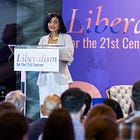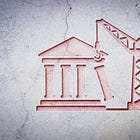Liberalism Is a Bold Force That Ends Corrupt, Oppressive, and Arbitrary Hierarchies
It doesn't defend the status quo, it upends it
In the contemporary imagination, liberalism means different things to different people. To some on the left, it means a set of deceptive platitudes masking an eventual, inevitable collaboration with fascists. To those on the populist right, it stands for out-of-touch technocracy, woke identity politics, and globalization hollowing out rural and industrial America. To many less ideological voters, it simply stands for the status quo and existing institutions—a status quo that many believe, or can be convinced to believe, is just not working for them.
What liberalism isn’t, for the most part, is appealing. Liberalism is in peril not because of philosophical defects or better available alternatives, but because liberals have too often struggled to make liberalism seem attractive, compelling, and exciting.
This is perhaps surprising. As Liberal Currents’ Samantha Hancox-Li puts it, liberalism used to be a fighting faith—she calls for it to be one again—that dismantled feudalism, abolished hereditary privilege, and fueled revolutions that replaced empires with republics. It expanded suffrage, ended slavery, and empowered movements for women’s rights, civil rights, and decolonization. Where liberalism flourished, it brought with it unparalleled peace and prosperity.
Liberalism’s early victories were bold and sweeping, in part because they had to be. Early liberals, advocating for human dignity and freedom against many different forms of oppression, were radicals within their own contexts. Liberalism, though, is not inherently radical: it does not possess the relentless internal logic of totalitarian systems that need an endless series of “enemies of the people” to war against. Nor does it seek to ceaselessly tear down. Neither is liberalism small-c conservative: At no point does liberalism proclaim itself satisfied with the status quo, content merely to treat politics as a defensive battle. Liberals seek to establish open and liberal societies—which sometimes requires sweeping revolution—but then to settle down to the more mundane tasks of both maintenance and refinement.
Yesterday’s liberals fought against kings and slaveowners; today’s liberals fight for better housing policy, immigration reform, and protections for the marginalized. While these causes are no less important for human dignity, we only deceive ourselves if we pretend that they capture the public imagination in the same ways.
Liberalism’s earliest successes were also its most broadly appealing: It is easier to persuade people that their lives will be better without a hereditary nobility or with a general franchise than it is to get them excited about wonky policy ideas about zoning reform. To preserve the blessings of liberalism, we’ll need to convince people of its continuing value.
Modern American politics is beset by a general anti-system, anti-establishment feeling. In many instances this is not particularly ideological, although it is vulnerable to co-option by opportunistic political innovators. Liberalism, fairly or not, is frequently identified with the establishment; thus, frustration with “the system” is easily directed towards a rejection of liberalism itself. This helps explain why old party lines are breaking down, and why we’re seeing unlikely coalitions form within the MAGA-aligned right itself: health conspiracists like RFK Jr., former socialists turned culture warriors, economic protectionists, and postliberal theocrats, among others. This coalition isn’t united by shared policy goals, but by a shared instinct: to dismantle liberal-democratic norms in favor of hierarchy, control, and a singular vision of national identity. It’s also a rejection of the idea that people deserve dignity at all.
Under these conditions, it’s more important than ever to present a clear, coherent, and compelling picture of liberalism as a political project worth buying into. Liberalism isn’t just for those who benefit from the current status quo, or those who aren’t temperamentally anti-establishment. It’s a vibrant intellectual tradition that has made massive contributions to human flourishing, and it’s the only answer to authoritarianism. The truth is, we can’t wait around for someone else to defend it.
Liberalism’s Foundations
It might be that liberalism is suffering from its own success. Liberalism’s benefits, unprecedented in prior societies, are now easily taken for granted. Reactionary political projects of various kinds can attempt to build support from within an assumed background of liberalism. As Brink Lindsey has argued, even some of the most aggressive postliberal critics are unconscious beneficiaries of open, liberal societies. Advocates of these political projects assume that we can retain all the benefits of liberalism—the increase of wealth and personal safety, technological advancement, peaceful political transition, the rule of law—while simply cutting out whatever parts of liberalism they dislike.
The benefits of liberalism, though, are largely not separable from the philosophy of liberalism. Illiberals attack along two main lines: that liberalism itself is responsible for a variety of social, economic, and political ills; and that illiberal regimes won’t strip away the gains in human flourishing that have been so hard-won under the past few centuries of liberalism. A revitalized liberal response, therefore, must meet both of those arguments head-on. Far from being a boring and stale political project, we should remind people of the bold claims of liberal ideas and the astonishing success they’ve already had.
At the center of the liberal project is a belief in the expansion of human dignity. Emily Chamlee-Wright, president of the Institute for Humane Studies, describes liberalism in terms of four corners—economic, epistemic, cultural, and political—all grounded in a core belief in human dignity.
Political liberalism, by its guarantee of process, representation, and the rule of law, protects us from the authoritarian impulses of both the dictatorial few and the populist many. It limits what the state may do to us, and it provides us with a variety of means—speech, protest, assembly—to make our voices heard.
Economic liberalism allows us all to prosper through free and fair exchange. It isn’t the same as a completely unfettered free-for-all (we have regulations to prevent fraud, ensure fair business practice, and protect consumers in various ways), and it certainly doesn’t require us to hand the wealthy the kind of political power that characterizes oligarchy. The economic liberal idea is that—once freed of cronyism, artificial barriers, and corruption—exchange between people all over the world will improve all our lives. And that idea has been consistently proven right.
Epistemic liberalism, in Chamlee-Wright’s words:
demands rules and norms that invite the open, respectful exchange of ideas in the collaborative process of seeking truth. ... It is epistemic liberalism that makes intellectual progress possible. It gives us the tools to collaborate and debate with each other in the joint project of self-governance. In epistemic liberalism there are no witch hunts, dissent is encouraged, and people are intellectually open and curious.
Epistemic liberalism accepts that we will not always agree and that the act of disagreement and dialogue is healthy for society.
Finally, cultural liberalism creates a pluralistic, tolerant society that grounds a robust exchange between people of different faiths, beliefs, and customs. The goal of such a society is that people learn, not simply to fear and hate others less, but to actively learn and benefit from their presence. Cultural liberalism does not necessitate the dissolution of particular cultural practices or beliefs; the point is not conformity but peaceful coexistence and dialogue.
Making the Liberal Project Compelling
Liberals believe in the dignity of all people and see the expansion of their freedom as central to upholding that dignity. This belief didn’t materialize out of thin air—it has deep philosophical roots grounded in centuries of intellectual and political progress.
From the Enlightenment onward, liberal thinkers challenged the inherited hierarchies of kings, emperors, warlords, and priests. They insisted that no man should rule another by divine right—that every person is capable of reason, entitled to liberty, and deserving of equal protection under the law. Liberal victories weren’t inevitable. They were won—piece by piece, through struggle, and against reactionary forces at every step. And today, in the face of the rise of the MAGA movement, that struggle continues just as it has in the past.
These foundational liberal values—the individual over the collective, reason over dogma, pluralism over tribalism—lie at the center of our disagreement with MAGA. Many on the right no longer believe in the core liberal premise that individuals should be free to chart their own course.
Liberalism used to be the background assumption of American politics. Quayle vs. Clinton, Bush vs. Gore, Obama vs. Romney—these candidates all shared a broad commitment to liberalism: the philosophy of individual rights, democratic institutions, markets, and pluralism that once united our politics despite partisan divides.
Disagreements between factions on economic issues, the classic left-right divide, made sense when everyone shared a moral framework for thinking about our fellow human beings. But when that framework shifts, the old lines stop working. What we’re witnessing today is a fundamental realignment away from the old left-right axis and toward a new divide between liberalism and authoritarianism, as The UnPopulist’s Shikha Dalmia has repeatedly stressed. This new framework transcends the old party lines. And it isn’t just ideological, it’s psychological. Authoritarianism is an instinct, a yearning for control, for hierarchy, and for simplicity. It manifests in different costumes, but it always tells the same story: trust the strongman, fear the outsider, silence the dissenter.
Ask yourself:
Is identity something you discover and create for yourself—or is it assigned to you at birth? More specifically, do people inherit their role in society based on gender, race, or class, or do they build their own identity?
Should we be open to the world or closed off from it? Does cultural exchange, immigration, and international trade make us stronger and more dynamic, or should we isolate ourselves to maintain order?
Does globalization improve our lives? Is economic dynamism and innovation a net positive, or should we cling to tradition and stability at all costs?
These questions aren’t just abstract thought experiments. They reveal something essential about your worldview. They draw from the work of Steve Davies at the Institute of Economic Affairs, who years ago suggested they’d become the new dividing lines in U.K. politics—and in many other Western democracies.
These questions represent the fault-lines of the political realignment unfolding in the United States today. If you answer yes to openness, creativity, and dynamism—you have a liberal sensibility. Not in the partisan sense, but in the philosophical sense: a belief in human freedom, progress, and pluralism.
Yet, our old mental models and many of our institutions remain stuck in the left-right divide. When decades of inertia underpin the instincts of our political leaders and institutions, it becomes impossible for many of them to rise to meet this moment. The political paralysis is real, and voters are fed up.
In the vacuum and demoralization following the last election, the authoritarians are already building. They promise safety by offering submission. They seek to dismantle truth, marginalize the vulnerable, and recast democratic norms as signs of weakness.
We must reject the lie that liberalism is the cause of our problems. It was the erosion of liberal values—not their application—that created the grievances authoritarians now exploit. The answer to our malaise is not deeper control, but renewed freedom.
If we are to rise to meet this moment, we need more than rhetoric—we’ll need courage and institutions willing to act on it. New institutions will need to be built, and old institutions must be willing to retool for the challenge of this moment.
The solution for today must be a recognition of our shared values and the realization of a movement centered around those values—a truly liberal movement that is prepared to go on offense, defend liberal democracy, and remind the public what liberalism means and why it matters.
This is a distillation of a Project Liberal manifesto that articulates the values of the new liberal coalition that is forming. Read the full manifesto here.
Follow us on Bluesky, Threads, YouTube, TikTok, Facebook, Instagram, and X.
We welcome your reactions and replies. Please adhere to our comments policy.










The case of liberalism vs feudalism, nobility, empires, privileges, etc, started among other things with the American and French revolutions. The question is who the privileged are today and what institutions and groups are in favor of keeping certain privileges in order to preserve a more authoritarian and collectivist social order. Because it is not only about Trump and right-wing populists.
Even certain older liberal institutions are having paradoxical problems. For example, when it comes to citizenship, liberal values and institutions create equality, democracy, and freedom within nations, while such processes and values are in general not generally exist above the nations.
One of the results is that liberal values are (mis)used to, for example, justify migration for richer persons who can buy passports, citizenships, and golden visas, while poor and economically deprived persons are being "othered" and prevented from migrating through arbitrary and discriminatory policies and borders.
Fascinating how the term liberal developed into different meanings in Europe and America when compared in general. One of the reasons is how the political party system is developed. But even in Europe, in terms of ideas and politics, some official liberals would be more suitable for the Democrats and some would be more suitable for the Republicans or even Independents